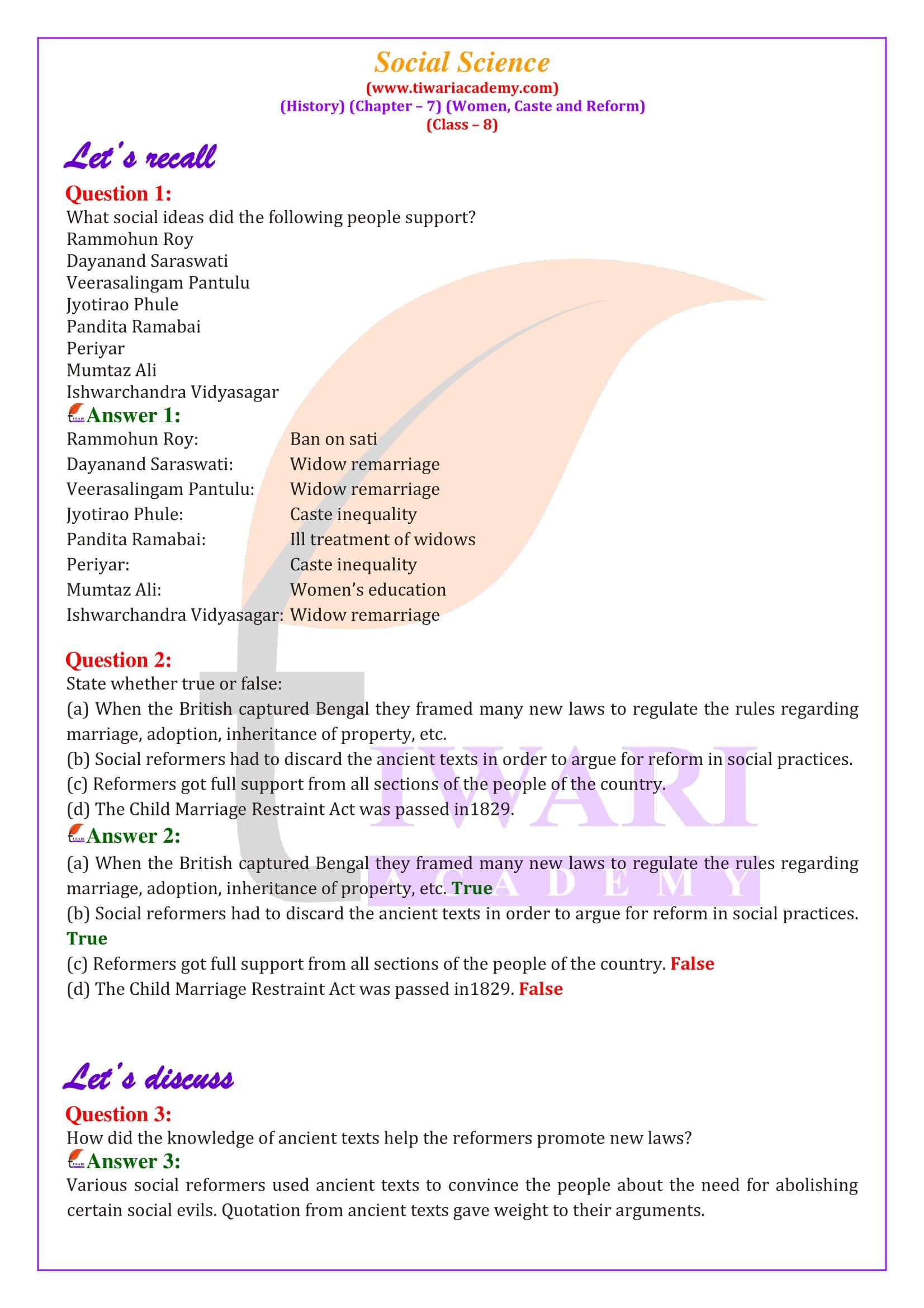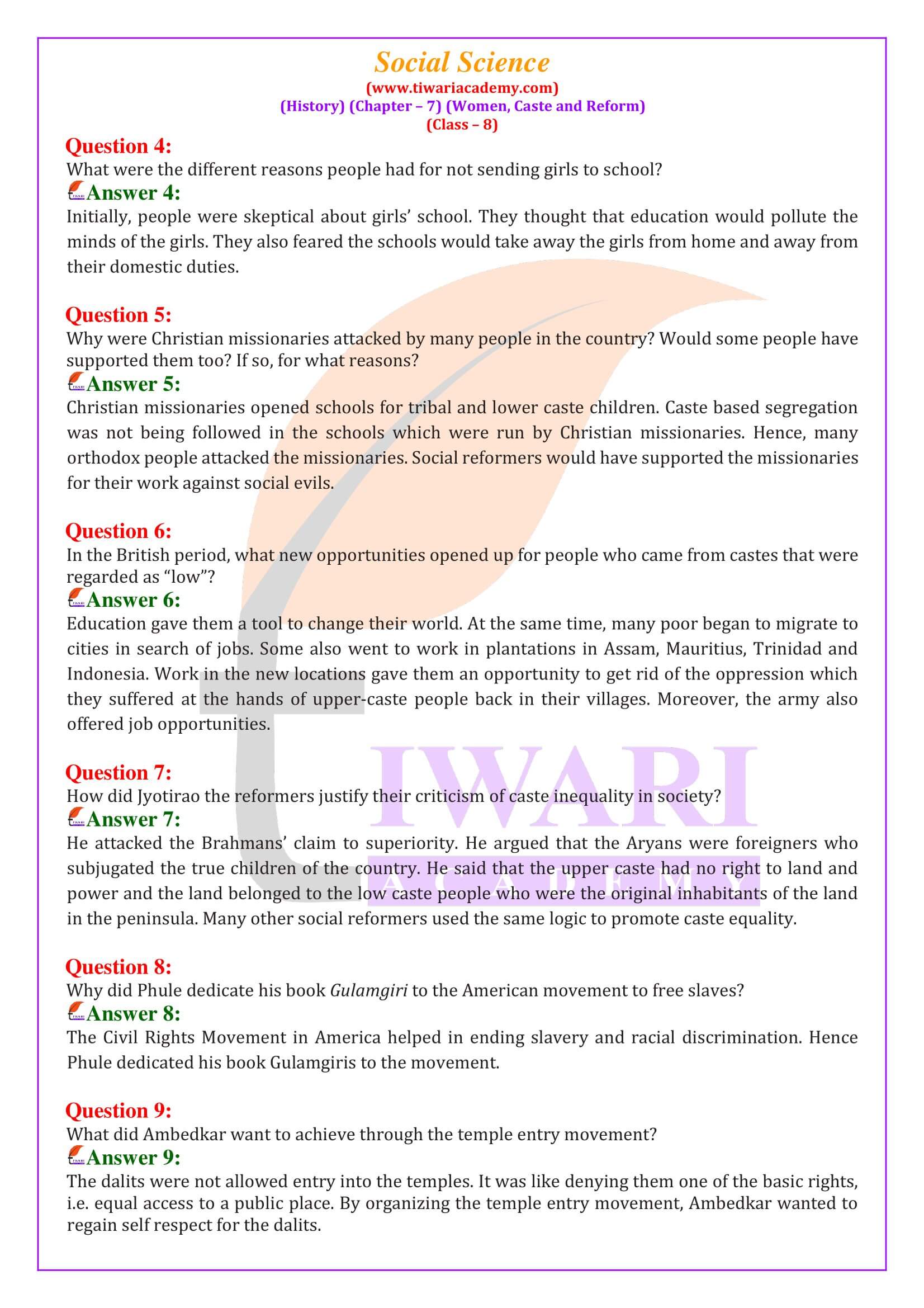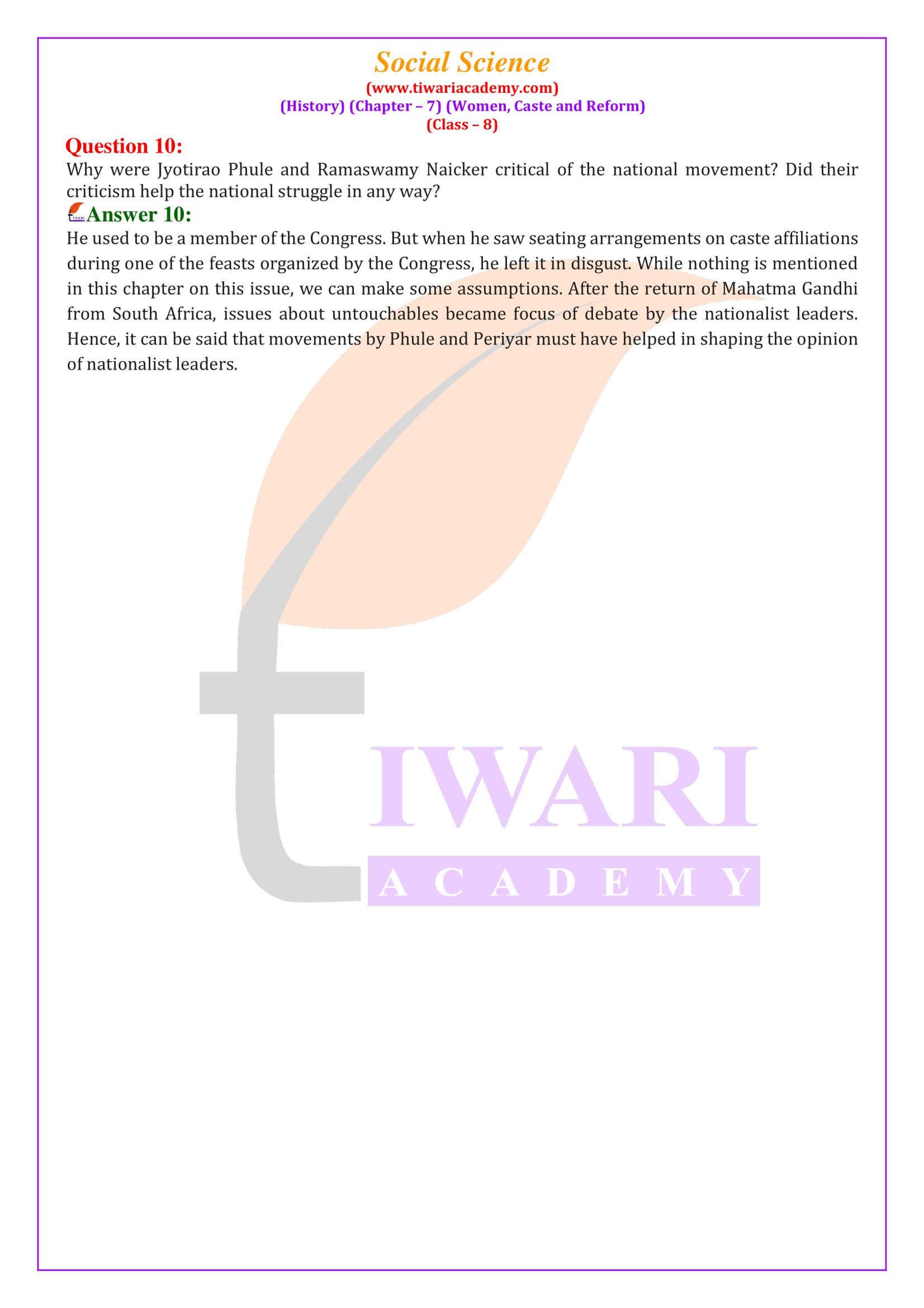NCERT Solutions for Class 8 Social Science History Chapter 7 Women, Caste and Reform in English and Hindi Medium revised and modified for academic session 2025-26. Get the updated solutions of class VIII History chapter 7 based on rationalised NCERT books issued for 2025-26 exams.
NCERT Solutions for Class 8 Social Science History Chapter 7
Download NCERT Solutions for other subjects in PDF format also. Discuss Your View here with your friends and share it to social media.
Class 8 History Chapter 7 Extra Questions
Describe the division of Castes system?
In most regions, people were divided along lines of caste. Brahmans and Kshatriyas considered themselves as “upper castes”. Others, such as traders and moneylenders (often referred to as Vaishyas) were placed after them. Then came peasants and artisans such as weavers and potters (referred to as Shudras). The upper castes also treated many of these groups at the bottom as “untouchable”. They were not allowed to enter temples, draw water from the wells used by the upper castes or bathe in ponds where upper castes bathed. They were seen as inferior human beings. Over the nineteenth and twentieth centuries, many of these norms and perceptions slowly changed.
What were the Remarkable Changes?
For the first time, books, newspapers, magazines, leaflets and pamphlets were printed. These were far cheaper and far more accessible than the manuscripts. Therefore ordinary people could read these and many of them could also write and express their ideas in their own languages. All kinds of issues – social, political, economic and religious – could now be debated and discussed by men (and sometimes by women as well) in the new cities. These debates were often initiated by Indian reformers and reform groups.
Describe the Brahmo Samaj?
Raja Rammohun Roy (1772-1833), founded a reform association known as the Brahmo Sabha (later known as the Brahmo Samaj) in Calcutta. People such as Rammohun Roy are described as reformers because they felt that changes were necessary in society, and unjust practices needed to be done away with. They thought that the best way to ensure such changes was by persuading people to give up old practices and adopt a new way of life.
Class 8 History Chapter 7 Question Answers
CBSE NCERT Solution for Class 8 Social Science History Chapter 7 Women, Caste and Reform is given below in updated form for session 2025-26. Visit to Discussion Forum to ask your doubts. You can also put your views for the facts asked by other users.
| Class: 8 | Social Science |
| Subject: | History |
| Chapeter 7: | Women, Caste and Reform |
| Content: | Textbook and Extra Questions |
| Content Type: | Online Text and Images Format |
Important Questions on 8th History Chapter 7
State whether true or false: When the British captured Bengal they framed many new laws to regulate the rules regarding marriage, adoption, inheritance of property, etc.
When the British captured Bengal they framed many new laws to regulate the rules regarding marriage, adoption, inheritance of property, etc. True
How did the knowledge of ancient texts help the reformers promote new laws?
Various social reformers used ancient texts to convince the people about the need for abolishing certain social evils. Quotation from ancient texts gave weight to their arguments.
Why were Christian missionaries attacked by many people in the country? Would some people have supported them too? If so, for what reasons?
Christian missionaries opened schools for tribal and lower caste children. Caste based segregation was not being followed in the schools which were run by Christian missionaries. Hence, many orthodox people attacked the missionaries. Social reformers would have supported the missionaries for their work against social evils.
In the British period, what new opportunities opened up for people who came from castes that were regarded as “low”?
Education gave them a tool to change their world. At the same time, many poor began to migrate to cities in search of jobs. Some also went to work in plantations in Assam, Mauritius, Trinidad and Indonesia. Work in the new locations gave them an opportunity to get rid of the oppression which they suffered at the hands of upper-caste people back in their villages. Moreover, the army also offered job opportunities.
How did Jyotirao the reformers justify their criticism of caste inequality in society?
He attacked the Brahmans’ claim to superiority. He argued that the Aryans were foreigners who subjugated the true children of the country. He said that the upper caste had no right to land and power and the land belonged to the low caste people who were the original inhabitants of the land in the peninsula. Many other social reformers used the same logic to promote caste equality.
Why did Phule dedicate his book Gulamgiri to the American movement to free slaves?
The Civil Rights Movement in America helped in ending slavery and racial discrimination. Hence Phule dedicated his book Gulamgiris to the movement.
What did Ambedkar want to achieve through the temple entry movement?
The dalits were not allowed entry into the temples. It was like denying them one of the basic rights, i.e. equal access to a public place. By organizing the temple entry movement, Ambedkar wanted to regain self respect for the dalits.
Why were Jyotirao Phule and Ramaswamy Naicker critical of the national movement? Did their criticism help the national struggle in any way?
He used to be a member of the Congress. But when he saw seating arrangements on caste affiliations during one of the feasts organized by the Congress, he left it in disgust. While nothing is mentioned in this chapter on this issue, we can make some assumptions. After the return of Mahatma Gandhi from South Africa, issues about untouchables became focus of debate by the nationalist leaders. Hence, it can be said that movements by Phule and Periyar must have helped in shaping the opinion of nationalist leaders.
Important Notes on 8th History Chapter 7
India 200 Years ago
Two hundred years ago things were very different. Most children were married off at an early age. Both Hindu and Muslim men could marry more than one wife. In some parts of the country, widows were praised if they chose death by burning themselves on the funeral pyre of their husbands.
Women who died in this manner, whether willingly or otherwise, were called “sati”, meaning virtuous women. In many parts of the country people believed that if a woman was educated, she would become a widow.






